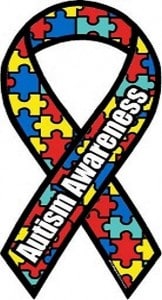
Scientists all over the world have been trying to find for many years now the reason behind the prolific rise in cases of autism among children. From one in 2500 in the US, there are now one percent kids labeled each day under the ‘autism spectrum’ umbrella.
Diet changes, lifestyle changes, even genetic changes have not been significant enough to alter the brain mapping of a person, resulting in the rise of the disorder seen over the last 10 years.
Some experts are suggesting that the increase in numbers could be due to over diagnosis where any child with a certain social dysfunction or obsessive behaviour is said to be within the autism spectrum. But the theory cannot fully justify the large number of cases detected each day.
One researcher, Prof. Simon Baron-Cohen, a psychologist at Cambridge University after years of research in the field suggests a plausible reason that may to a certain extent explain why so many children are today termed as autistic.
According to the professor’s theory of ‘assortive mating’ when people with strongly ‘systemising’ personalities – the sort of people who become engineers, surgeons, computer experts and who shine in some aspects of business – marry each other and produce children, the effects of this kind of ‘male brain’ are genetically magnified, increasing the chances of producing an autistic child.
The professor suggests that a child with autism may actually have an ‘extreme male brain’.
People who are termed ‘systemisers’ are most commonly brilliant in their chosen profession, slightly obsessive, perfectionists, make great scientists and are often good at music. But they are also not very social in nature, and uncomfortable interacting with people. These combinations can be termed as being at the milder end of the autism spectrum. Therefore, the child of two people with such personalities might have a higher chance of showing autistic behavior.
Cambridge University’s Autism Research Centre is now taking a step further to confirm the theory and requesting members of the public to help by taking part in a survey which will investigate any links between educational achievement, what kind of job they have and how their children develop.
The theory might have some base, as can be seen by the rise in autism cases in Silicon Valley California, where some of the brainiest individuals work as technicians, engineers and programmers in the computer industry. There are also more women in this field than a decade or two ago and therefore, number of partners where both are systemisers has increased.
The role of women in the society has also changed significantly over the last hundred years. From staying at home, more women nowadays are engineers, doctors and other professionals quite capably using their brain power.
According to the 1901 Census, there were fewer than a hundred registered female doctors in the whole of the United Kingdom. Going to universities was difficult and expensive, the educational opportunities for girls were limited and many were not even thinking about career.
Women could be teachers, governesses, nurses or artists but seldom were seen in the business world as frequently as today. Engineers, scientists, doctors were even rarer.
Women who did have an IQ in the 140s were actually not looked upon as marriageable material and many of the ‘brainy’ ones did not prefer to marry owing to the biases of some companies that fired women as soon as they got engaged.
Therefore, many systemisers remained unmarried earlier or married very late when they had fewer children.
But things have changed drastically in the last fifty years. Career oriented women are not looked down upon but the ‘alpha females’ on the contrary have become desirable partners. While once doctors married nurses, more doctors are now married to fellow doctors.
Although Prof. Cohen points that ‘alpha females’ are not necessarily strong systemisers the phenomenon of like-marrying-like may be having completely unexpected consequences that go far beyond mere equal opportunities for women.
With changing society trends it is indeed not impossible to rule out the theory. The survey results may surely throw some light to the puzzle of autism and why so many children are affected by it in the present age.
Related Articles:
- Study: Possible Link Found Between Autism and Excess of Neurons
- Personal Reputation Not a Concern for Those with Autism
- The Power Of Pretend Play
- Down Syndrome Families Speak Out About Their Experience






